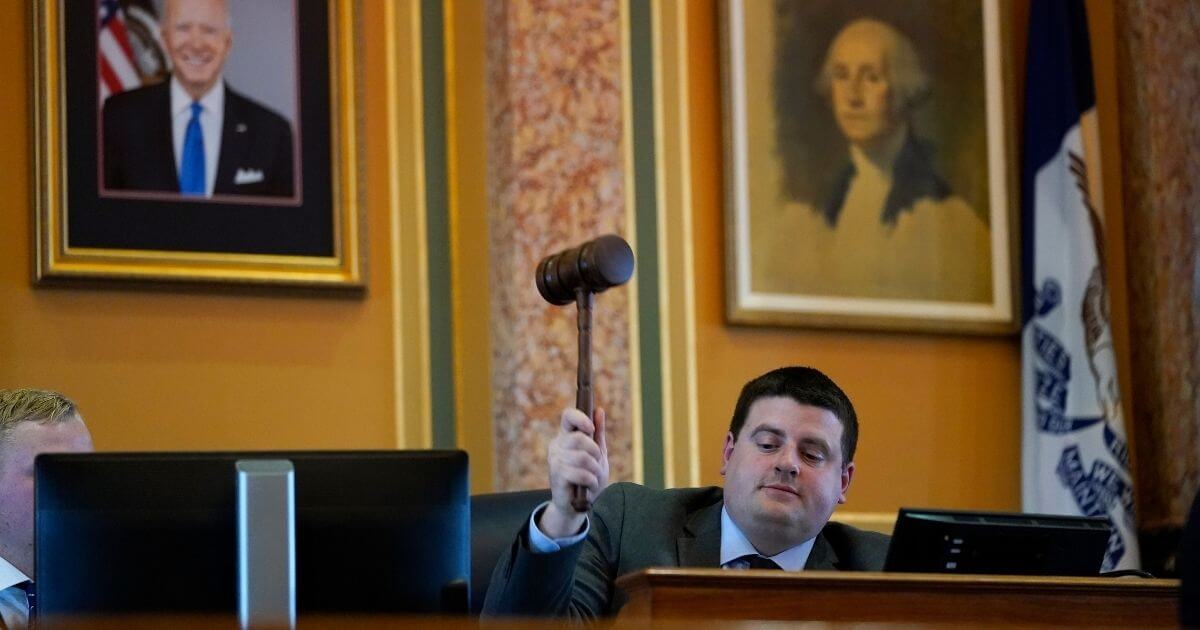
House Speaker Pat Grassley pounds the gavel during the opening day of the Iowa Legislature, Monday, Jan. 10, 2022, at the Statehouse in Des Moines, Iowa. (AP Photo/Charlie Neibergall)
As Iowa lawmakers kick off the 2023 session today, advocates for Iowa’s working people worry majority Republicans will continue to pass more legislation that will hurt working families.
“I just hope there aren’t any more economic attacks,” said Felicia Hilton, political director of the North Central States Regional Council of Carpenters. “It’s really impacting families.”
But advocates are also hoping Republicans—who hold power in the governor’s office and Iowa House as well as a supermajority in the Senate—will pass at least some bills helpful to workers. That includes some bills that either passed out of committee or actually got a vote in one of the chambers last year, but didn’t quite make it to the governor’s desk to be signed into law.
“Generally, things are a stepping stone up there,” said Christopher Smith, the state legislative director for the Sheet Metal, Air, Rail and Transportation (SMART-TD) union.
[inline-ad id=”1″]
Here’s what to watch for this session:
What would help workers
- No more noncompete agreements for low-wage workers
When a Dubuque resident was laid off from a pizza place four years ago, she found a job at another a couple of months later—and was immediately sued by the first place for $10,000 for violating a noncompete agreement.
That agreement said she wasn’t allowed to work at another pizza restaurant within 50 miles for 18 months after the layoff, according to a video shared by Dubuque Democratic Socialists.
It’s a perfect example of why such agreements—often mandatory for workers upon their hiring—are exploitative and restrict workers from advancing in their careers, according to Pete Hird, the secretary/treasurer for the Iowa Federation of Labor AFL-CIO.
“These agreements affect all types of workers: blue collar, white collar, fast food, hair salons and even apprentices in the construction trades,” Hird said.
[inline-ad id=”0″]
A bill prohibiting employers from forcing such agreements on workers who make less than $14.50 per hour passed the Senate unanimously last year, but wasn’t given a vote in the House.
But this might be the year, said Hilton, especially as the Federal Trade Commission came out with a new rule targeting noncompetes in recent days. She added she was hopeful the wage threshold might be raised to include construction apprentices as well, who hop jobs as needed to finish their training.
“We’re hoping that moves … and we’re hoping that we’re able to exempt apprentices as well,” Hilton said.
- Workers who adopt given same parental leave as workers who have biological children
Right now, employers don’t have to provide their company’s leave to new parents who adopt their children rather than birth them biologically.
But a bill passed last year’s House unanimously that would mandate employers give those adopting children up to six years old the same leave policy as biological parents.
Though it stalled in a Senate committee, Hird said he was hopeful it would come back this year.
A total of 1,266 children were adopted by Iowa parents in 2020, the last year for which data was available, a number that has increased every year.
[inline-ad id=”2″]
- Limiting the length of trains that block crossings and impede emergency services
As the railroads continue to increase productivity and make up for their labor issues by lengthening trains, Smith hopes a bill his organization is working on will give some relief to public safety officials and community leaders worried about blocked crossings.
The bill would limit trains—which currently have no federally mandated maximum length, and lately have reached 3 or 4 miles in length—to 8,500 feet. That’s about all a state legislature can do, since a series of court rulings have confirmed only Congress can limit the amount of time a train can block a crossing.
In 2018, when he was a spokesperson for Class I railroad CSX, Smith told a publication the industry had “safely operated trains of all lengths for years.”
Now on the legislative side, he told Starting Line that the bill would help communities deal with “blocked crossings and emergency services.”
“I got it through committees last year,” but there was ultimately no vote yet, he added.
What wouldn’t help workers
- Private school vouchers
House Democratic Leader Jennifer Konfrst said last year’s Putting Students First Act voucher bill would benefit “only 2% of Iowa students … while the rest of Iowa kids in public schools would end up losing opportunities,” a claim Politifact Iowa rated as “true.”
Nevertheless, it’s a priority for Gov. Kim Reynolds, who helped defeat some Republicans in their primaries for voting against this issue alone.
[inline-ad id=”3″]
- Further weakening of child labor laws
In 2021, the minimum age for a worker to operate an amusement park ride was lowered from 18 to 16. In 2022, the minimum age for those operating pizza dough rolling machines was also lowered from 18 to 16.
And, seemingly in a bid to help the state’s child-care crisis of not having enough providers, lawmakers passed a bill allowing one 16-year-old to watch up to 15 children without any adult supervision.
Hird said he wouldn’t be surprised to see more bills letting minor workers be put in more dangerous situations like these.
“We are always watching out for changes to child labor law, and the threat has significantly increased with employer demands for more workers,” Hird said.
- More hurdles for the working poor on assistance
As Republican states continue to blame poor people for their state’s financial problems (while passing tax cuts for wealthy people), Hird expects to see Iowa follow the lead of other red states who have applied increasingly onerous means testing, work requirement rules and now “asset verification” for people using Medicaid, SNAP and children’s health insurance programs.
He said such asset verification—which punishes couples for things like having a savings account or more than one car—”could kick tens of thousands of people off the programs” and increasing poverty in the state.
“We haven’t raised the minimum wage … we’re at 12% child poverty,” Hilton said. “I just don’t think that there should be any more attacks on hourly workers.”
[inline-ad id=”4″]
- Protecting insurers instead of Iowans faced with medical errors
A frequent target of lawmakers who work in a city called a “global hub of the insurance industry,” medical malpractice reform or “tort reform” comes up frequently at the statehouse.
The latest iteration in the last few years would prohibit a jury from awarding more than $250,000 to someone who was affected by a doctor’s mistake, something Hird said he expects to come up again this session.
Medical errors are an issue that has affected 1 out of every 5 Iowans, according to David P. Lind, president of Heartland Health Research Institute in Clive.
Lind said in a 2020 letter to the Des Moines Register that such laws in other states have not resulted in fewer injuries or deaths from medical errors. But they have saved insurance companies a lot of money.
“Any meaningful reform must begin at the health care organization level, ensuring that a healthy work environment exists for safe care and best practices,” Lind wrote. “Placing strict caps on damages provides no consequential incentives for health care organizations to establish genuine protocols to ensure a culture of safety and better care.”
- Protecting the trucking industry instead of those injured in an accident
Though it didn’t pass either chamber last session, Hird expects a bill to resurface this session that caps non-economic damages in a trucking accident, regardless of how many people are injured or killed.
“Previous bills have also included removing the liability and responsibility of trucking company employers” who hire, train and supervise employees, Hird added.
by Amie Rivers
1/9/23
[inline-ad id=”0″]
If you enjoy stories like these, make sure to sign up for Iowa Starting Line’s main newsletter and/or our working class-focused Worker’s Almanac newsletter.
Have a story idea for me? Email [email protected], or find me on Twitter, TikTok, Mastodon, Post, Instagram and Facebook.
Iowa Starting Line is part of an independent news network and focuses on how state and national decisions impact Iowans’ daily lives. We rely on your financial support to keep our stories free for all to read. Find ISL on TikTok, Instagram, Facebook and Twitter.
Support Our Cause
Thank you for taking the time to read our work. Before you go, we hope you'll consider supporting our values-driven journalism, which has always strived to make clear what's really at stake for Iowans and our future.
Since day one, our goal here at Iowa Starting Line has always been to empower people across the state with fact-based news and information. We believe that when people are armed with knowledge about what's happening in their local, state, and federal governments—including who is working on their behalf and who is actively trying to block efforts aimed at improving the daily lives of Iowan families—they will be inspired to become civically engaged.


Big corporations are suing to block Biden’s efforts to lower costs
From the cost of medication to education to everyday expenses, the Biden administration has passed several laws and implemented many federal rules...

Iowa Republicans make outlawing gay marriage key 2024 campaign priority
Iowa Republicans have made outlawing gay marriage a key goal in their 2024 party platform. During the Iowa GOP’s 2024 state convention on Saturday,...

Department of Justice says Iowa immigration law violates US Constitution
If Iowa doesn’t suspend the enforcement of its new immigration law by May 7, the state could face a federal lawsuit, according to the Des Moines...

Rushing: Iowa State president said the quiet part out loud
I want to thank Iowa State University President Wendy Wintersteen for doing us all a favor by finally saying the quiet part out loud: all the...

Iowa sets aside almost $180 million for year two of voucher program
Iowa has committed nearly $180 million in taxpayer funds to support private school tuition in the 2024-25 school year, which is almost $50 million...

Kalbach: Immediate action needed on corporate ag pollution
Iowa agriculture has undergone substantial changes over the past 40 years. We see it all around us. Rather than crops and livestock being raised on...





